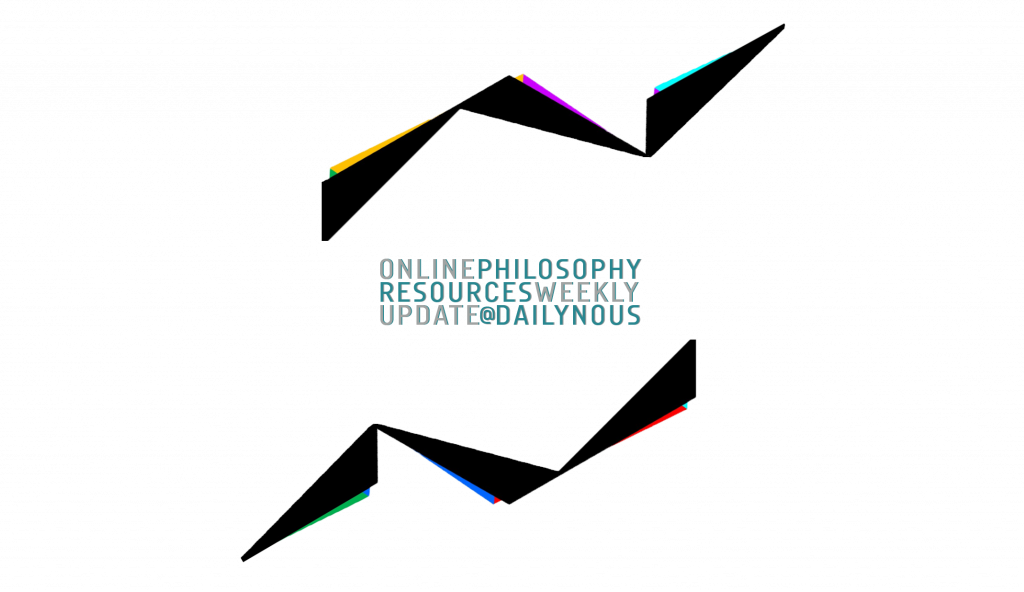Online Philosophy Resources Weekly Update
The weekly report on new and revised entries at online philosophy resources and new reviews of philosophy books…

Reminder: if your journal publishes open-access book reviews, please send in links to them for inclusion in future weekly updates.
New:
- Reverse Mathematics by Benedict Eastaugh.
Revised:
- Causation in the Law by Michael Moore.
- Leibniz’s Influence on 19th Century Logic by Volker Peckhaus.
- Compatibilism by Michael McKenna and D. Justin Coates.
- Ethics in Indian Buddhism by Charles Goodman and Aaron Schultz.
- Radulphus Brito by Ana María Mora-Márquez and Iacopo Costa.
- Michael Oakeshott by Terry Nardin.
- Johann Sturm by Andrea Sangiacomo and Christian Henkel.
- The Logic of Mass Expressions by David Nicolas.
- Structuralism in Physics by Heinz-Juergen Schmidt.
- Evolutionary Psychology by Stephen M. Downes.
IEP ∅
NDPR ∅
- The Mind-Body Problem: What Are Minds? by Jacob Berger.
Open-Access Book Reviews in Academic Philosophy Journals
- How Knowledge Grows: The Evolutionary Development of Scientific Practice by Chris Haufe is reviewed by Juan V. Mayoral at The Journal of the British Society for the Philosophy of Science.
Recent Philosophy Book Reviews in Non-Academic Media
- The Need for Roots by Simone Weil is reviewed by Becca Rothfeld at The Washington Post.
- Alasdair MacIntyre: An Intellectual Biography by Émile Perreau-Saussine, translated by Nathan J. Pinkoski is reviewed by Jonathan Rée at The London Review of Books.
- Tyranny of the Gene: Personalized Medicine and Its Threat to Public Health by James Tabery is reviewed by James Le Fanu at Literary Review.
- Thoreau’s Axe: Distraction and Discipline in American Culture by Caleb Smith, Henry at Work: Thoreau on Making a Living by John Kaag, and Jonathan van Belle, and Henry David Thoreau: Thinking Disobediently by Lawrence Buell are together reviewed by Costica Bradatan at the Times Literary Supplement.
Compiled by Michael Glawson
BONUS: Bentham meets God


Re: No. 4, the revised entry on Indian Buddhist ethics:
Although Jay L. Garfield is mentioned (once) in the entry, there is no reference to his book nor does it appear in the bibliography. And I wish the entry would have looked at what has come to be called (socially) engaged Buddhism, which Garfield had the good sense to discuss in his Buddhist Ethics: A Philosophical Exploration (Oxford University Press, 2022). Finally, I was surprised to see no mention of the Indian emperor Aśoka (304-232 BCE) who ruled the Mauryan Empire on the Indian subcontinent from c. 270-232 BCE. As a convert to Buddhism, and in addition to his appreciation of the need for religious toleration and heterodoxy, Aśoka “laid down what are perhaps the oldest rules for conducting debates and disputations, with the opponents being ‘duly honoured in every way and on all occasions,’” indeed, Amartya Sen suggests we view these as “a kind of ancient version of the nineteenth-century ‘Robert’s Rules of Order’” (Sen: xii-xiii and 16). His edicts gave shape to an understanding of the Dharma of Buddhism, meaning for him “a moral polity of active social concern, religious tolerance, ecological awareness, the observance of common ethical precepts, and the renunciation of war [the sound of drums becomes the sound of spiritual understanding, morality, and mind training—dharma—not war]:” (Please see this link*). Otherwise, I found it a helpful entry. (Incidentally, the title in the preview is broader than the title of the entry, which does not mention Tibetan Buddhism although in correspondence Jonardon Ganeri did inform me that there is a forthcoming entry on ethics in Tibetan Buddhism).
* I would now add to the list of references and further reading in the link from RLL: Bruce Rich, To Uphold the World: A Call for a New Global Ethic from Ancient India (Beacon Press, 2010).
The Sen reference is from his book, The Argumentative Indian: Writings on Indian History, Culture and Identity (Farrar, Straus and Giroux, 2005).
I do not know why the parenthetical link in my comment failed to show properly so I hope this works: https://www.religiousleftlaw.com/2011/10/a%C5%9Boka-buddhist-emperor-of-india.html